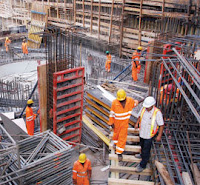Why Africa must industrialize
 |
Hydro power dam under construction:
Investments to remove bottlenecks |
HERE IS A PARADOX: Africa has posted robust economic growth
over the last decade. Her growth now is higher than the western world and is
projected to post robust rates in the next five years. Yet Youth unemployment
remains high and so is inequality in income distribution. What is wrong?
According to experts, this growth is not well diversified so
that its benefits reach a large segment of Africans, hence growth with high
unemployment rates.
According to the economic report on Africa, era 2013 Africa must
industrialize to diversify and consolidate the benefits of the robust economic
growth of the last decade. It is rich in commodities and other resources.
However, the continent’s resources are extracted and sold raw in the world. The
resources thus do not have a forward linkage with the domestic economy.
This is why continent must industrialize, beginning with commodity based industrialization. This means that Africa must start processing its raw materials into finished goods or semi-finished goods. Manufacturing commodities will: increase their links to the domestic economy, create more jobs, transform our economies, distribute wealth more equitably and finally, stabilize growth.
 |
| Sea port: Also under going improvements in Africa |
Commodity exports, say
experts, are subject to vagaries of the market demand: When demand on the world
Market is high; the prices are high when demand falls prices fall. High
commodity prices lead to faster economic growth while lower prices lead to
depression. In the past decade commodity prices have been high becoming one of
the drivers of Africa’s robust growth.
However, it is time to move to the next level:
Industrialize. The continent has in place all the ingredients needed to
industrialize: It has a young and well educated population; its middle class is
growing with a per capita GDP growth above three per cent a year and, finally
the continent is edging closer to integrating its market.
COMESA, for instance, is likely to be one large FTA in 2017.
This will bring together a population of 600million with a GDP per capita above
US$1700. Once operational, COMESA will be the largest market bloc in Africa
covering 60 per cent of its population.
There are two or so missing links however; transport and
energy infrastructure. Energy and transport
contribute to the cost of doing business in Africa. The continent depends
on the unreliable hydropower which is not even enough to meet domestic demand.
This makes it vulnerable to shortages of electricity especially during
drought. To ensure continuity the region relies on expensive thermal
power to keep the economy running. The result is expensive products and
stagnant manufacturing units.
Economics theory
teaches that, low cost of production attracts investment into a location. Africa
is set to cut the cost of energy and transport, given the amount of investment
into both. In fact investment is infrastructure is one of the drivers of
economic growth says Era 2013.
Africa is
investing in an energy mix that includes, Hydro, wind and geothermal power
which is expected to be fully operational in the next five to ten years. In
addition, there is a flurry of discoveries of LNG, which could also add to the
mix. Consequently, the cost of energy is expected to decline in the next five
years. Both Geothermal and Wind power cost an estimated US$0.07 per Kilowatt
hour.
There is also
increased investment on Sea Port and road linking regions in a country and
countries in a region. Also plans are at
an advanced stage to for construction of new railway lines. The idea is to link
Africa with itself thus creating a large market for African industrial goods.
Given its large
and relatively prosperous population, Africa is potentially a large market for
manufactures. But its current structure is that it is a source of raw materials
for industries in Europe. Consequently,
its infrastructure is directly linked to the former colonizers. For instance, to fly from Anglo-phone Africa
to a country in the Franco-phone Africa one has to be routed through Europe.
Even the railway lines and roads link directly to sea port serving the former
colonizers.
This increases
the cost of doing business in Africa. The development of intra-Africa road and
railway lines will remove this wall and open the continent for business.



Comments
Post a Comment